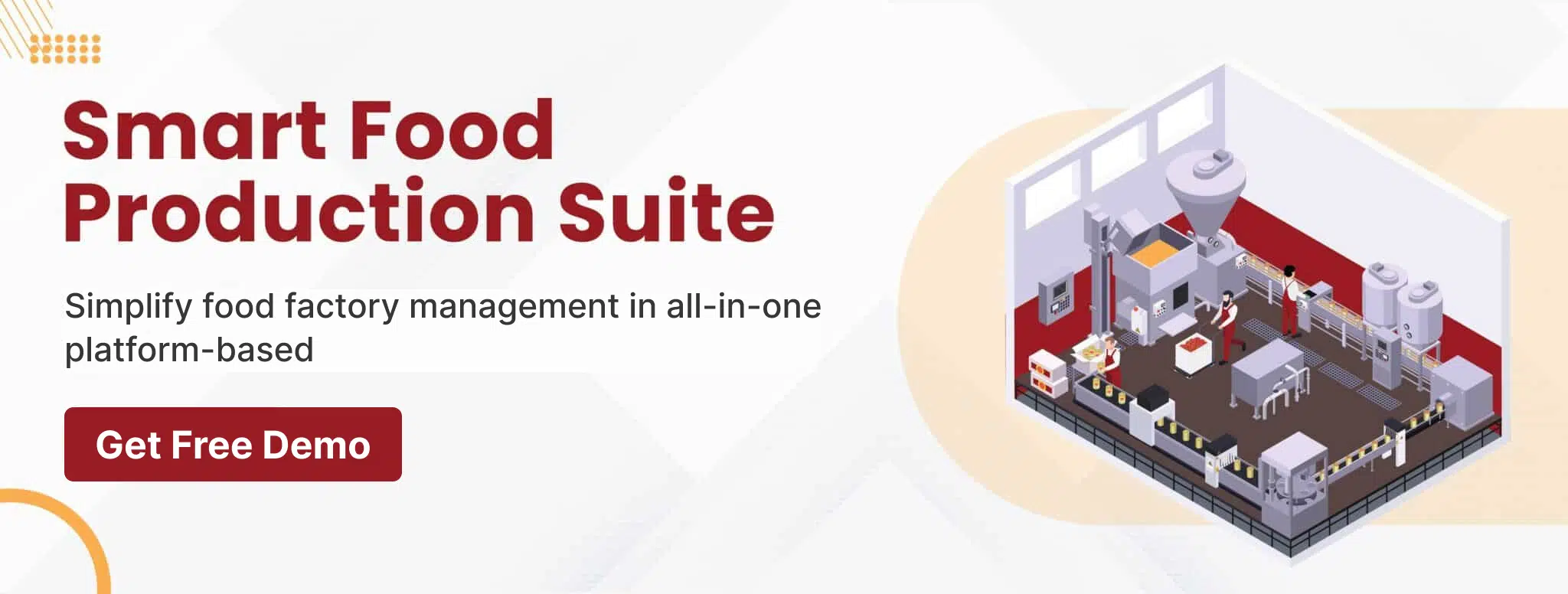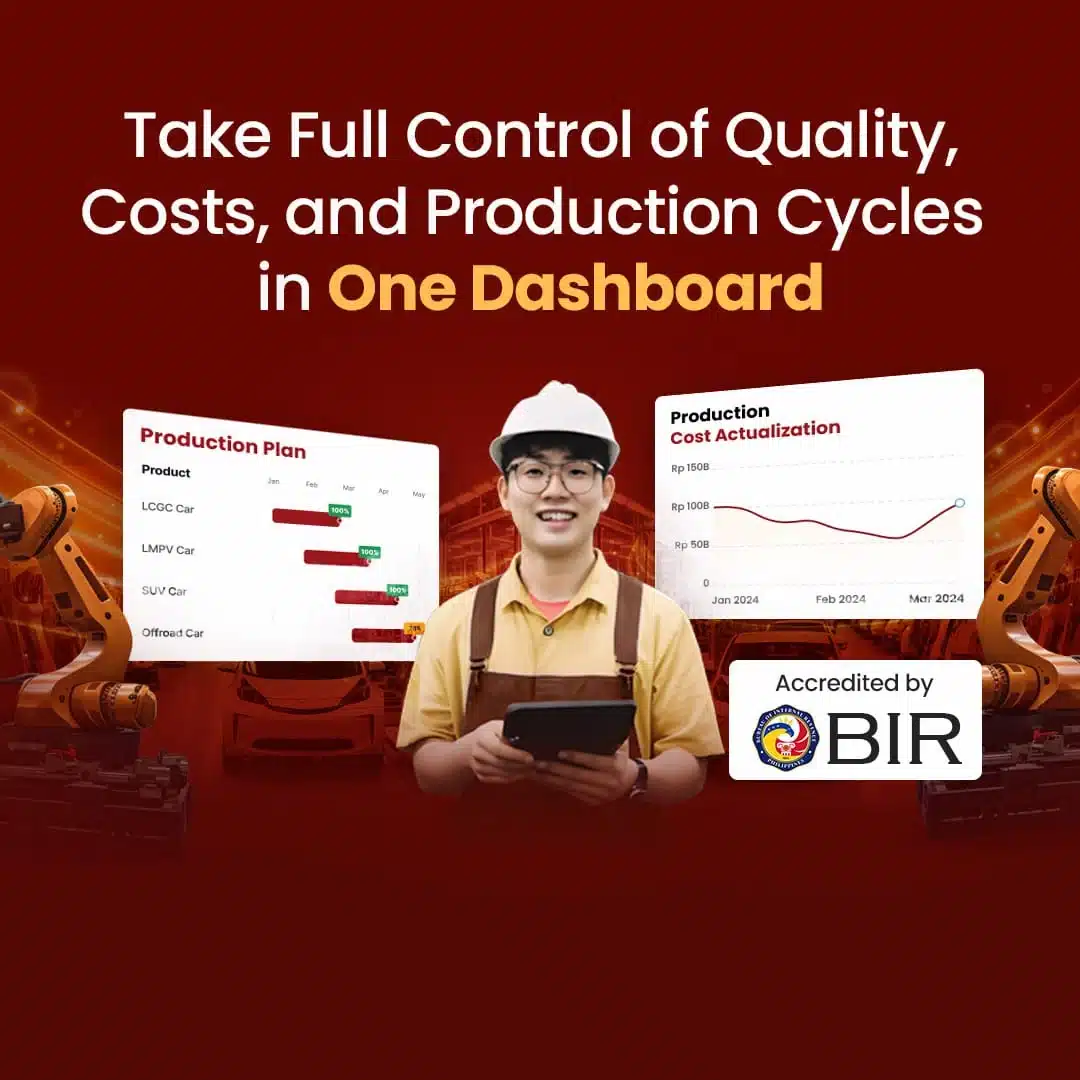In the Philippines, where the food manufacturing sector accounts for 9.8% of the GDP and employs around 1.2 million individuals, the integration of effective ERP software is not just a strategic move but a critical one. In 2021, nearly one-third of manufacturing establishments were engaged in the production of food products, highlighting the sector’s expansive reach and importance.
However, without the adoption of specialized food manufacturing ERP software, companies face the risk of operational inefficiencies, compromised product quality, and regulatory non-compliance. These issues can lead to significant financial losses and damage to brand reputation.
This article is a comprehensive guide, providing valuable insights into the best food manufacturing ERP software available in the Philippines. It aims to equip decision-makers with the necessary information to select a software solution that not only streamlines operations but also ensures adherence to the highest standards of quality and compliance.
Table of Contents

Key Takeaways
|
Why Philippine Companies Must Use a Food Manufacturing ERP System?
Before we dive into a long list of the best food manufacturing ERP in the Philippines, let’s revise briefly what the ERP system is, the benefits of using food manufacturing ERP for Philippines companies, and the consequences if they insist on not implementing the system.
ERP stands for Enterprise Resource Planning. Think of it as a super tool that combines all the different parts of a food company—like making products, keeping track of money, and delivering orders—into one big system. It’s like having a command center where you can see and control everything that’s happening in your business.
For food manufacturers in the Philippines, using ERP software is super important. It helps them monitor all the ingredients and products, ensure they’re making the right amount of food, and keep customers happy by delivering what they want on time. Plus, it ensures they follow all the food safety rules, which is a big deal.
But if a company doesn’t use ERP, it might waste a lot of money because it makes too much food or buys too many ingredients. It could also get in trouble for not following safety rules, and customers might not trust it if it messes up its orders.
Now, let’s talk numbers. According to Gitnux, companies that use ERP can see a 95% improvement in how they run their business. They can save money, make better products, and keep growing. However, if they don’t use ERP, they could lose much money and customers because they’re not as organized or efficient.
So, using ERP software is a smart move for any food company in the Philippines. It’s like having a secret weapon that helps them do better than their competitors and keep making tasty food for everyone.
Best Food Manufacturing ERP Recommendation in the Philippines
Now that we’ve covered why ERP software is a game-changer for food manufacturers in the Philippines, let’s dive into the heart of the matter—the best ERP solutions out there.
We’ve compiled a list of top-notch ERP software, each with special features to help your business thrive. Whether you’re a small startup or a big player, this curated selection is designed to help you find the ERP system that feels just right for your company’s needs.
1. HashMicro’s food manufacturing ERP
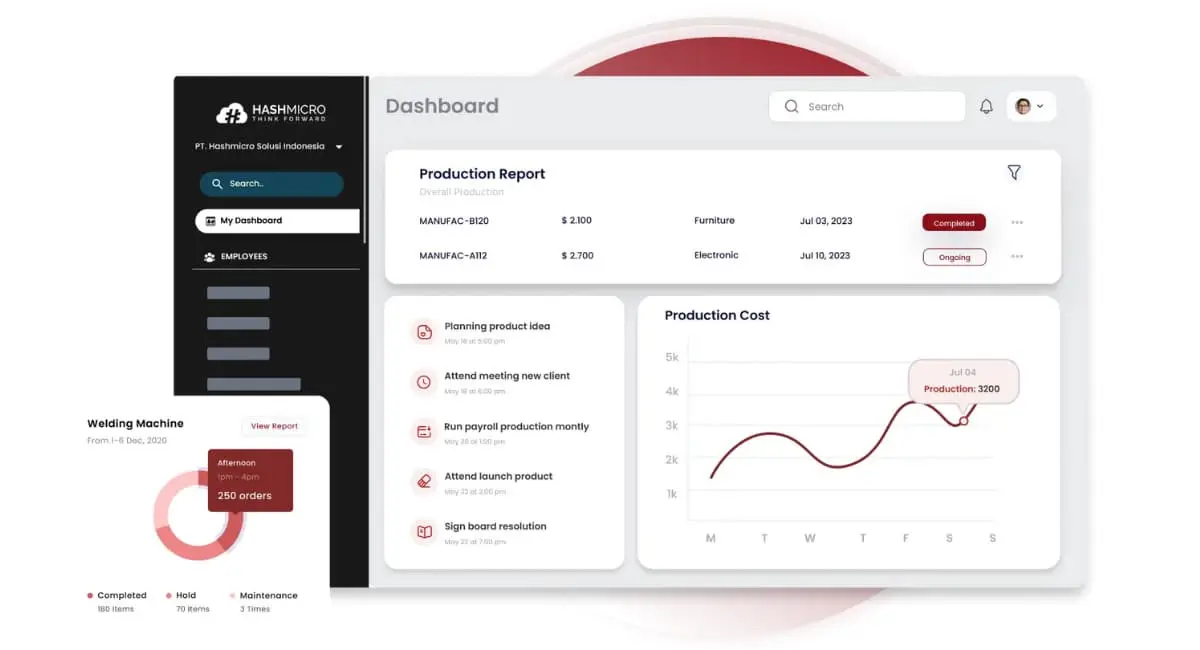
HashMicro’s food manufacturing ERP is a cloud-based system that offers a suite of over 40 integrated modules tailored to simplify business processes across various industries.
It is trusted by a diverse range of clients, including those in the manufacturing sector, and is recognized for its ability to increase business efficiency. The highly customizable software can be integrated with third-party applications or existing systems, ensuring a seamless fit into any business’s unique workflow.
HashMicro’s commitment to innovation is evident in its robust ERP solutions, which are designed to cater to the specific needs of its clients, including those in the food manufacturing industry.
Best features:
- Kiosk mode: This feature lets employees quickly report their work progress and any production problems, making the food manufacturing process more transparent and responsible.
- Manufacturing production scheduling: Simplifies production planning with the help of MES, ensuring resources and time are used effectively to meet customer needs and keep production efficient.
- Secret Bill of Materials (BoM): It handles detailed recipes and materials, ensuring accurate ingredient tracking and cost management, which are key to consistent products and profit.
- Manufacturing requisition planning: It streamlines the management of materials and buying, cuts waste, and keeps production on schedule.
- Finished goods production simulation: This feature models and forecasts finished product processes, optimizing resources, anticipating bottlenecks, and aiding in production adjustments for better planning, reduced waste, and enhanced quality.
- Material, labor, and overhead costs management: Tracks production costs, including raw materials, labor, and indirect expenses, aiding in budgeting, cost control, and pricing for profitability.
- Manufacturing quality control: It ensures top quality and safety by applying strict checks and controls during production.
Strengths:
- No hidden costs: You can add users or change features for free, with no extra costs.
- Comprehensive resource planning: HashMicro ERP boosts efficiency with its wide-ranging resource planning features.
- Integrated customer relationship management: The system improves customer service by adding CRM to the ERP solution.
- Detailed financial management: It allows for precise financial planning and management, which is vital for any business.
- Process standardization: HashMicro ERP makes business processes smoother, more consistent, and more efficient.
- Data-driven decision-making: The software helps businesses make smart decisions with useful insights.
- Robust integration capabilities: HashMicro ERP works with many other software, making it more useful and flexible.
Weaknesses:
- Various features: The system is more suitable for businesses that need many features to facilitate their complex business needs.
Don’t let generic solutions hold you back. HashMicro Manufacturing ERP is designed to grow with your business with its benefits of manufacturing software, providing the tools you need to succeed. Get a customized quote and take control of your manufacturing processes. Calculate your total cost of ownership now and start building a brighter future for your business.
2. Deacom ERP
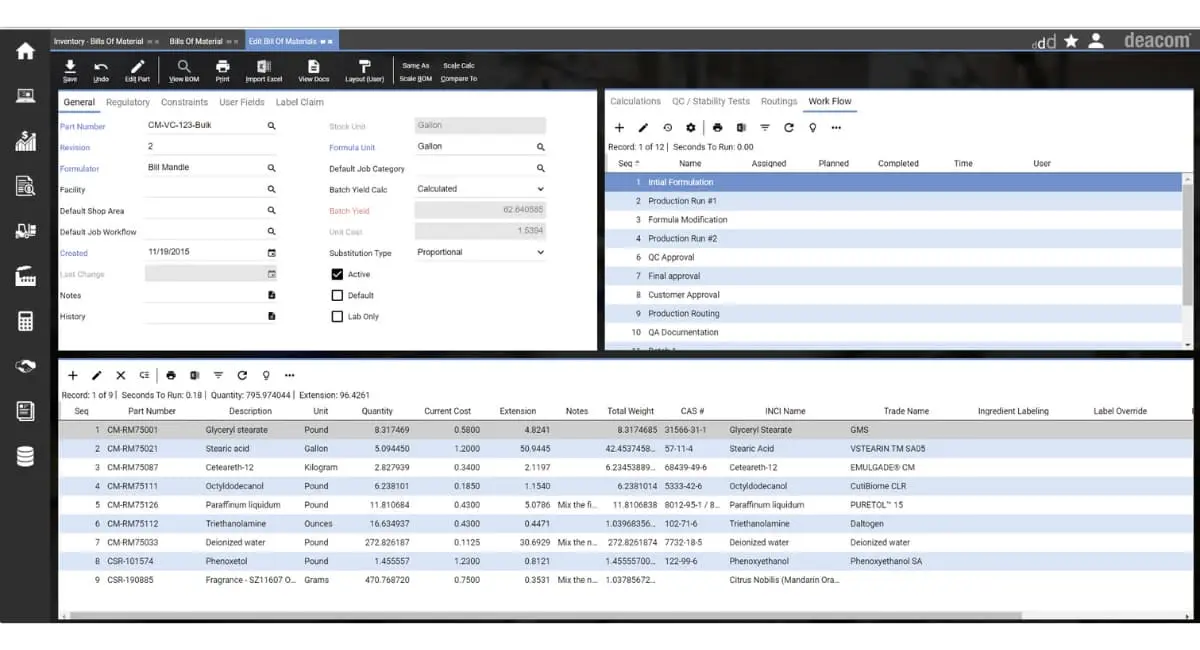
Deacom ERP is an ERP software primarily designed for process-based manufacturers. It integrates various business functions such as MRP, production, traceability, quality control, seed-to-sale, forecasting, and billing, offering a unified view of an organization’s operations.
It emphasizes simplicity and efficiency in business management and is known for its user-friendly interface, accessible across all devices with a browser.
Best features:
- Supply chain planning: Tools for planning materials, predicting production, using equipment well, and managing inventory.
- Manufacturing operations: It offers tools for managing manufacturing and guaranteeing the production of high-quality products.
- Warehouse and inventory management: Real-time inventory management and efficient warehousing.
- Sales, accounting, and financial reporting: This feature manages sales orders, special pricing, and transfers between companies, and it offers various financial reports.
Strengths:
- Infinite serialization levels for diverse requirements.
- Integrated QC tests throughout the product lifecycle.
- Seamless regulatory compliance with ERP foundation.
- User-friendly interface that is regularly updated and accessible across all devices.
Weaknesses:
- A steep learning curve can be challenging for new users.
- The single-system approach limits customization options for businesses with unique needs.
3. SYSPRO ERP
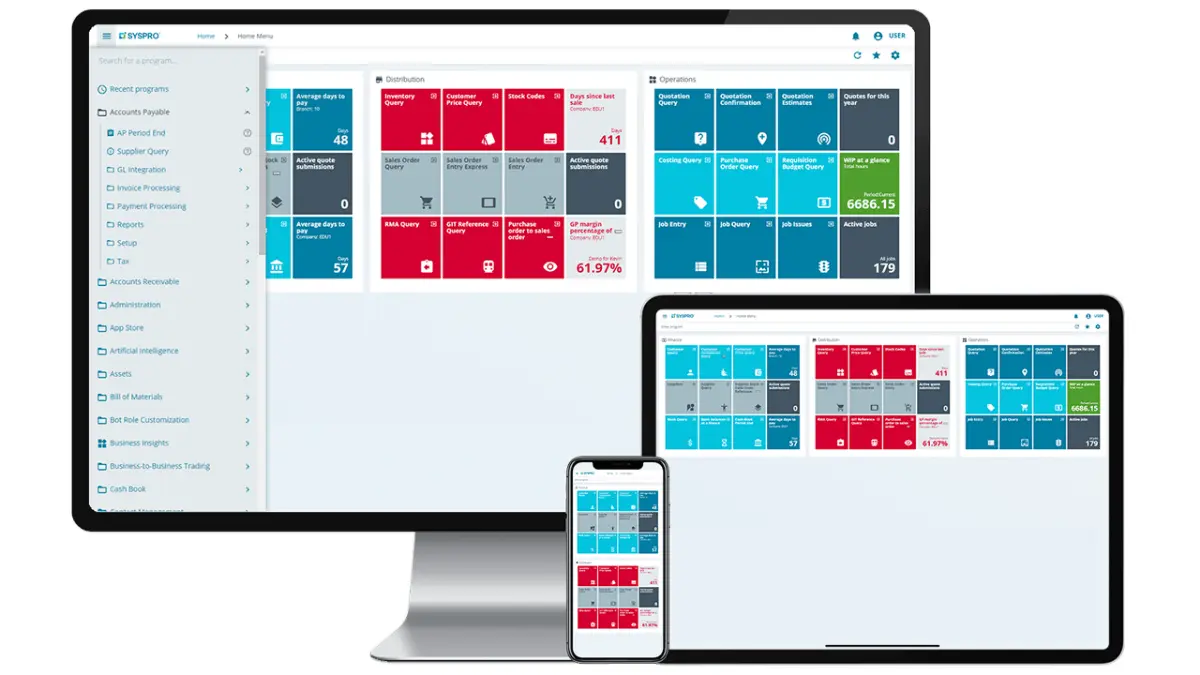
Syspro ERP is a modular, scalable manufacturing ERP solution that can be customized to meet a business’s specific needs. It is available as both a cloud-based and on-premise system, making it versatile for different IT infrastructures.
The system is known for its exceptional inventory management and supply chain management features, which are crucial for manufacturing, distribution, or retail companies.
Best features:
- Advanced inventory management: Syspro offers sophisticated tools for managing inventory levels, ensuring optimal stock availability.
- Scalable modular system: The ERP system can grow with your business, adding modules as needed.
- Comprehensive features: It covers many functions, such as budgeting, financials, CRM, forecasting, and supply chain management.
Strengths:
- Industry-specific solutions: Tailored ERP solutions for the manufacturing industry.
- User-friendly interface: Easy navigation with a choice of toolbar layouts.
- Scalability: The system can adapt to the growing needs of a business.
- Comprehensive support: Strong customer service and support infrastructure.
Weaknesses:
- Lack of HR-related features: Syspro does not include modules for human resources management.
- Cost: It can be pricier than other options.
- No free trial: Potential users cannot try the system before purchasing.
4. BatchMaster
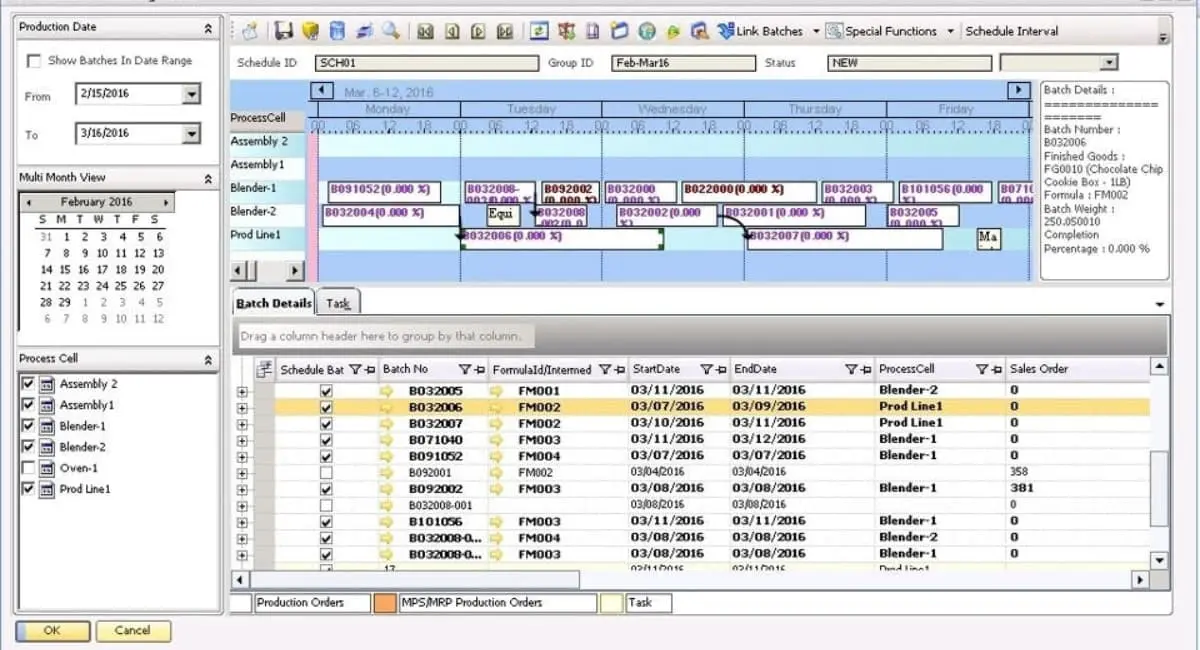
BatchMaster is an end-to-end process and formula-based manufacturing ERP developed by BatchMaster Software. It supports critical functions such as R&D, formulation, packaging, costing, production, QC, QA, inventory, compliance, and traceability.
The software is designed to streamline operations, scale up production, reduce costs, and ensure regulatory compliance. It can run with third-party solutions like QuickBooks, Sage 100 & 300, Microsoft Dynamics GP, and SAP Business One Financials and is available as both an on-premise application and a cloud-based version.
Best features:
- Comprehensive formula and recipe management: Allows dynamic adjustment of ingredients to meet various targets.
- Seamless integration: Works with leading financial systems.
- Quality control and compliance features: Employs inspection plans, checklists, and QC tests to ensure product quality and compliance.
Strengths:
- Industry-specific functionality: Tailored for process manufacturers in the food and beverage industry.
- Scalability: Suitable for small to medium-sized businesses, with the ability to handle growth and increased complexity.
- Regulatory compliance: Generates compliant labels and documents for standards like FDA and GHS/SDS and supports audit reports for regulatory adherence.
- Traceability: Offers robust lot traceability and recall capabilities, essential for food safety and compliance.
Weaknesses:
- Learning curve: The comprehensive nature of the software may present a steep learning curve for new users.
- Customization limitations: While it offers a single-system approach, this may limit customization options for businesses with unique needs.
5. Sage X3 ERP
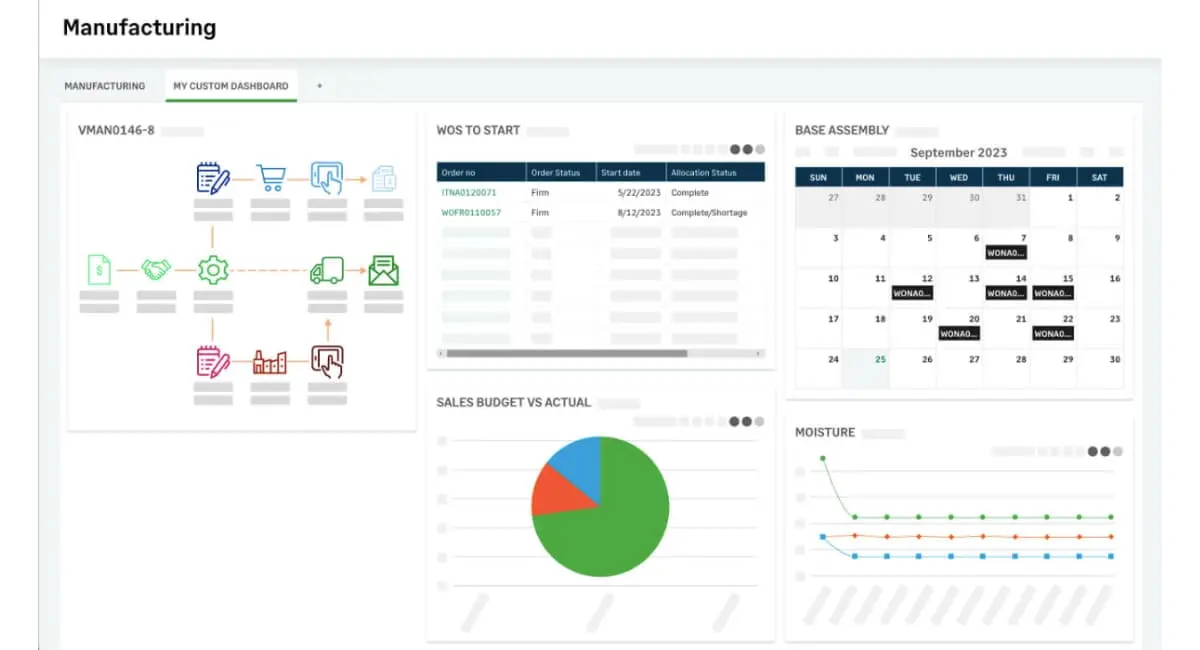
Sage X3 ERP, developed by the Sage Group, is designed to efficiently manage and integrate core business processes. Established in 1997, it has evolved to meet complex and dynamic business needs.
The platform offers various features, including supply chain management, finance, production, inventory management, and customer relationship management.
Best features:
- Visibility and control: This feature provides visibility of overall business operations, enabling faster and more accurate decisions based on real-time data.
- Modular design: It has many modules that make business tasks like sales, finance, CRM, warehouse, and supply chain easier.
- Reporting and analytics: Strong reporting capabilities and deep analytics for comprehensive monitoring of company performance.
Strengths:
- User-friendly interface: Known for its navigable and UI/UX-driven interface with customizable dashboards.
- Scalability: Built to accommodate multiple lines of business and adaptable to both current and future company needs.
- Fully integrated processes: Automates and integrates processes across the business, enhancing efficiency.
Weaknesses:
- Custom configuration difficulty: Some users have reported challenges with custom configurations.
- Customer support concerns: There have been concerns regarding the level of customer support provided.
- Limited quality controls: The quality controls within the system may not meet the needs of all businesses.
6. Microsoft Dynamic 365
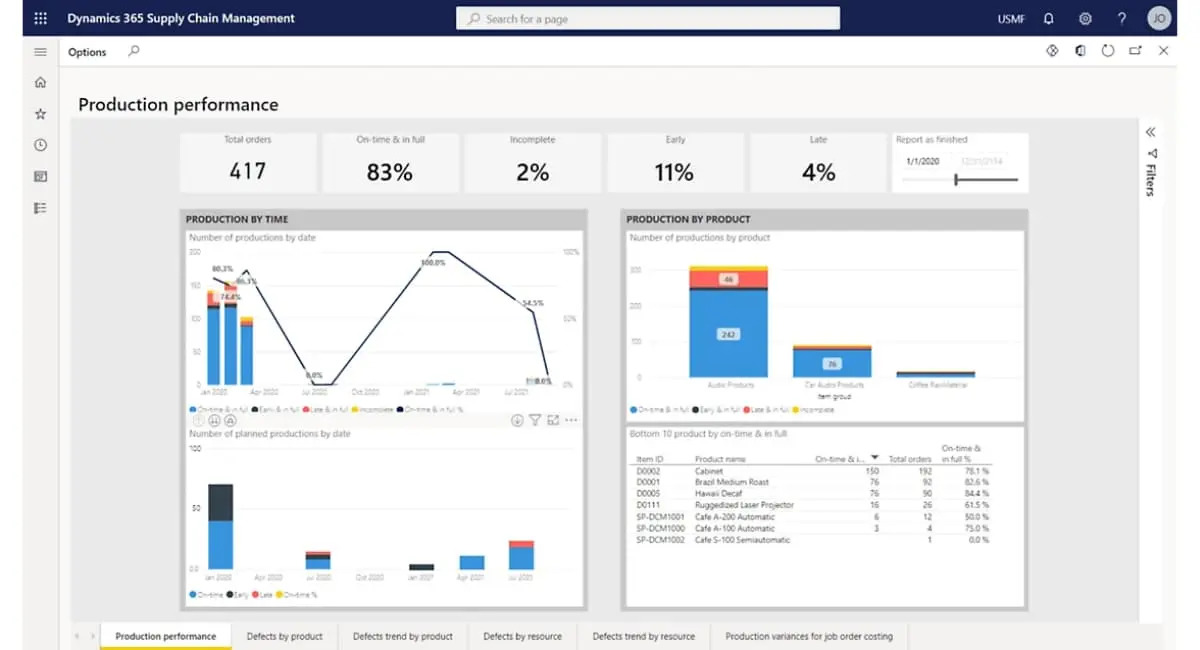
Microsoft Dynamics 365 is a suite of business applications with ERP functionalities that can be deployed both as a cloud-based service and on-premises. It offers a variety of applications designed for sales, marketing, customer service, finance, supply chain, and HR, all neatly packaged in a centralized location.
Dynamics 365 Business Central is specifically tailored to meet small and medium-sized businesses’ unique needs, providing an affordable and scalable solution that supports rapid growth.
Best features:
- Wide range of applications: Offers a diverse set of tools for managing essential operations across various business functions.
- Flexible deployment: Available as both a cloud service and an on-premises solution, with a mobile app for on-the-go management.
- Warehouse management and reporting: Advanced warehouse management capabilities and insightful reports generation.
Strengths:
- Integration with Microsoft products: Seamless connection with other Microsoft products, enhancing productivity and collaboration.
- Scalability: Suitable for businesses of various sizes, with the ability to adapt to rapid growth.
- Mobile app: Provides professionals with the flexibility to manage their tasks and time efficiently from anywhere.
Weaknesses:
- Software integration: Additional software integration is available as an add-on, which may incur extra costs.
- No free version: While a free trial is available, there is no permanent free version of the software.
- Complexity: The wide range of features may present a learning curve for new users.
7. Plex Manufacturing Cloud
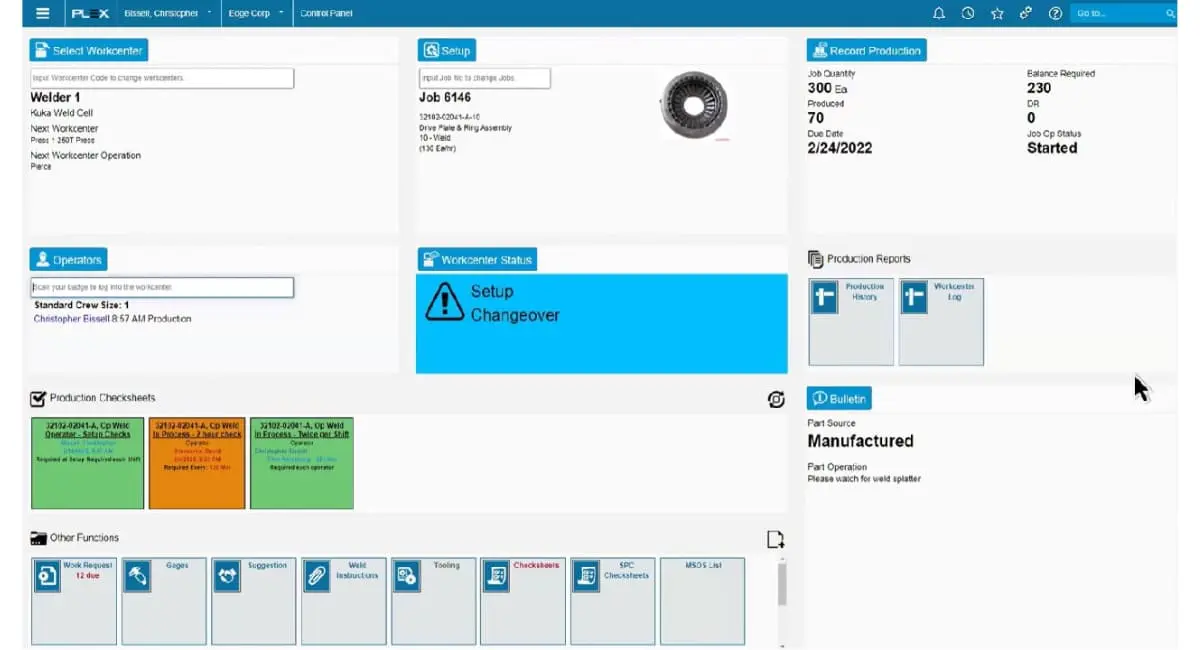
Plex Manufacturing Cloud is a comprehensive manufacturing execution system (MES) and enterprise resource planning (ERP) solution. It offers a real-time view of the entire production lifecycle across all plants, providing enterprise-wide visibility in one holistic system.
The software is designed to improve efficiency, reduce costs and errors, and increase throughput and on-time delivery performance.
Best features:
- Real-time visibility: Across the entire manufacturing workflow from suppliers to customers.
- Advanced scheduling: Optimizes production plans while considering constraints.
- Quality management: With statistical process control, traceability, and corrective actions.
- Seamless connectivity: Responds to market demands or customer changes without interrupting production.
Strengths:
- Focused on manufacturing: It’s built for manufacturing, with the necessary depth to reduce risks and comply with laws and industry rules.
- Everything in one place: It manages finance, operations, and IT in one system, linking all levels with complete production and supply chain oversight.
- Purpose-built ERP for manufacturing: Leverages a system focused on the industry’s unique demands.
Weaknesses:
- Complex configuration: Some users have reported challenges with custom configurations.
- Customer support: There have been concerns regarding the level of customer support provided.
- Learning curve: The comprehensive nature of the software may present a steep learning curve for new users.
8. Katana MRP
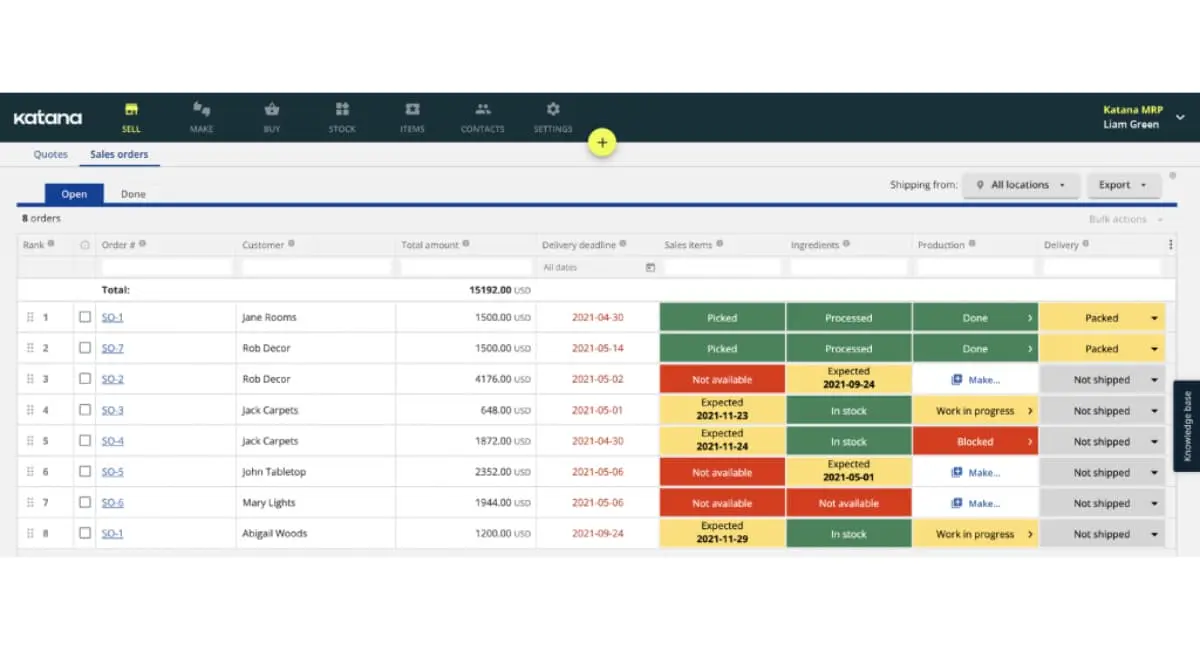
Katana MRP supports both made-to-order (MTO) and made-to-stock (MTS) workflows, offering features like inventory management, production planning, sales order management, and material purchasing.
Its native integrations and developer APIs make it easy to integrate with other software, ensuring that manufacturing data and teams are in sync with the rest of the business.
Best features:
- Live inventory management: Provides real-time control over stock levels, reducing stockouts and overstock.
- Seamless integration: Natively integrates with popular e-commerce and accounting for manufacturing platforms.
- Visual production planning: Offers a clear visual interface for managing production schedules and resources.
- Accurate costing: Calculates costs based on product recipes and production operations.
Strengths:
- Support for workflows: Can handle both MTO and MTS workflows simultaneously.
- Customer support: Known for excellent live support and a comprehensive knowledge base.
Weaknesses:
- Cloud installation only: No on-premise option is available, which may not suit all businesses.
- Limited batch tracking: Not available in the Essential plan, which could be a drawback for some manufacturers.
- No HR integration: Lacks features for human resources management, which may require additional software for HR tasks.
9. CAI Food Connex
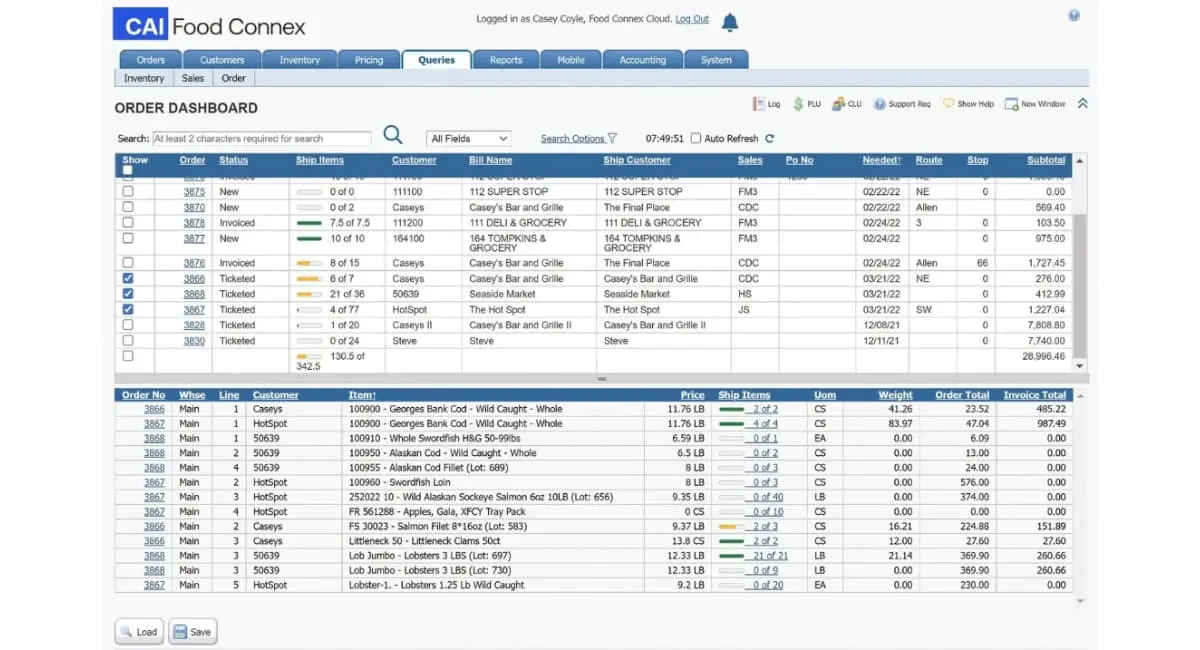
CAI Food Connex ERP software is tailored for food distributors and processors to enhance productivity and profitability. It provides industry-specific solutions such as catch or variable weights, traceability, scanning, labeling, breaking cases, and different types of production. The software aims to streamline workflow, improve customer service, and reduce costly mistakes.
Best features:
- Sales order management: A single customizable screen displays historical orders, current inventory, and pricing to help recommend and upsell products.
- Real-time inventory: On-demand access to inventory to immediately answer customers’ questions and deliver best-in-class service while making the sale.
- Integrated accounting: Quick and easy QuickBooks integration to manage pricing and profitability, eliminating the hassle of multiple stand-alone systems.
Strengths:
- Managed IT services: Professional team of IT-accredited engineers to manage and maintain cloud-based or on-prem IT infrastructure.
- Sophisticated inventory management: Ability to assign unique lot numbers and batch codes for traceability through various stages.
- Real-time inventory management: Provides on-demand access to inventory for immediate customer service response.
Weaknesses:
- No multi-slot capability: Lacks multi-slot capabilities at the lowest subscription tier.
- May require integrations: Additional integrations might be needed for intricate warehouse structures and operations.
10. JustFood ERP
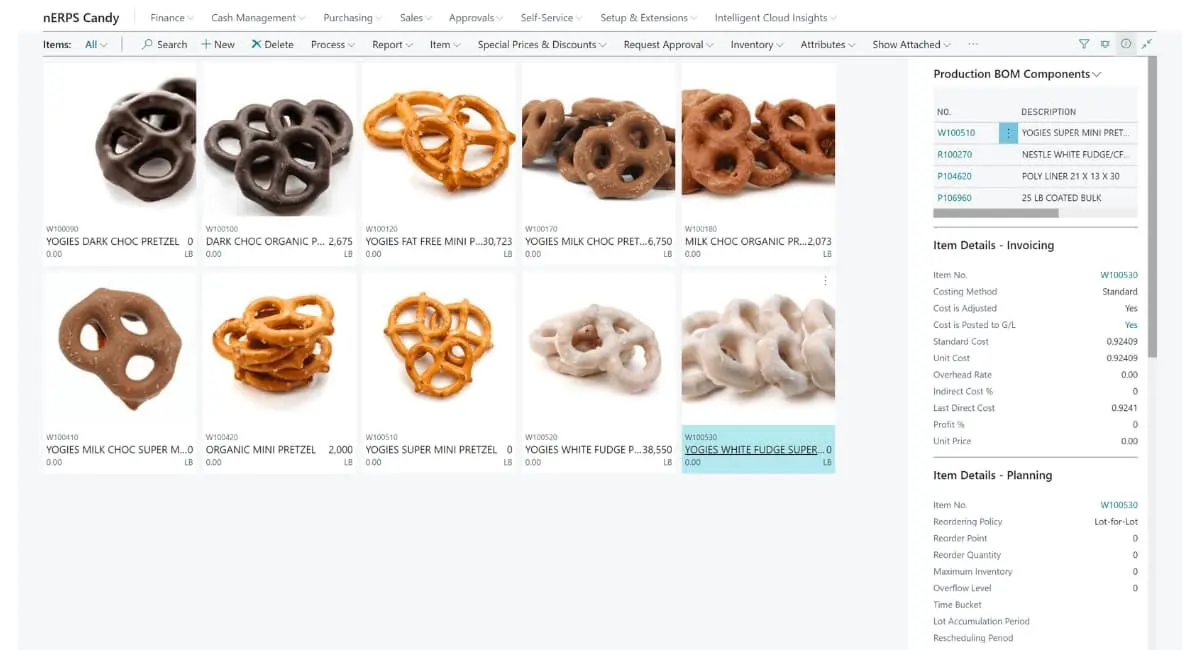
JustFood ERP software integrates departments, data, and processes into a single cloud ERP solution. It manages every aspect of a food business, from the moment materials enter the facilities until the finished product is delivered to the customer.
The software ensures superior data integrity, production management, quality control, safety, sales, delivery, finance, and forecasting.
Best features:
- End-to-end management: Manages the entire business process from material entry to product delivery.
- Quality and compliance: Supports SQF, BRC, FSMA, GFSI, and HACCP initiatives with mandatory quality audits and checks.
- Warehouse and inventory: Offers lot tracking functionality and bin management for accurate inventory reporting.
- Manufacturing and production: Integrates production scheduling and batch management for more efficient manufacturing.
Strengths:
- Food industry specific: Developed with hundreds of features addressing safety, compliance, quality, and production.
- Cloud-based: Runs on the Microsoft Cloud platform, ensuring accessibility, scalability, and reliability.
- Microsoft Dynamics integration: Includes all the features found in Microsoft Dynamics, with additional food-specific functionalities.
Weaknesses:
- Complex configuration: Some users report difficulties with custom configurations.
- Customer support: There are concerns about the level of customer support provided.
- Learning curve: The comprehensive nature of the software may present a steep learning curve for new users.
11. Acumatica ERP
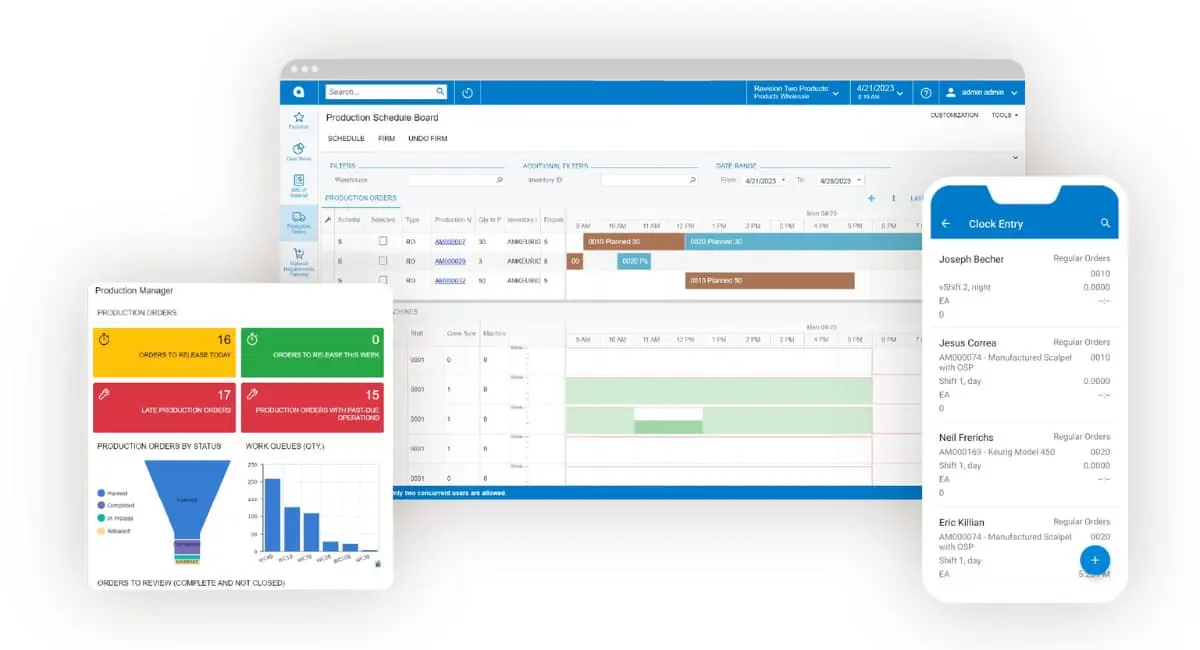
Acumatica ERP is designed to help businesses manage their operations in a streamlined and efficient manner. Its modular architecture allows businesses to choose the specific modules that meet their requirements and then scale as they grow and their needs change over time.
The Acumatica System provides role-based views and dashboards for business, finance, IT, operations, and sales and marketing leads, enabling users to create their customized dashboard views and get work done quickly without having to switch between different modules constantly.
Best features:
- Modular architecture: It gives the flexibility to license only the modules needed and add more as the business grows.
- Industry-specific editions: Available in five different editions to meet specific industry requirements.
- Robust APIs: For rapid integration and future-proofing the business with AI-enabled capabilities.
- Supports remote collaboration: Facilitates remote and in-field collaboration, which is increasingly important.
Strengths:
- Built for growing businesses: It’s scalable and adaptable to the changing needs of a growing company.
- Flexible cloud hosting options: Offers both public and private cloud to keep data secure and accessible.
- Utilizing AI: AI-enabled and supports rapid integration with other systems.
Weaknesses:
- Cloud-only deployment: It may not suit businesses looking for on-premise solutions.
- No free version or trial: Potential users cannot try the system before making a purchase decision.
12. MRPeasy
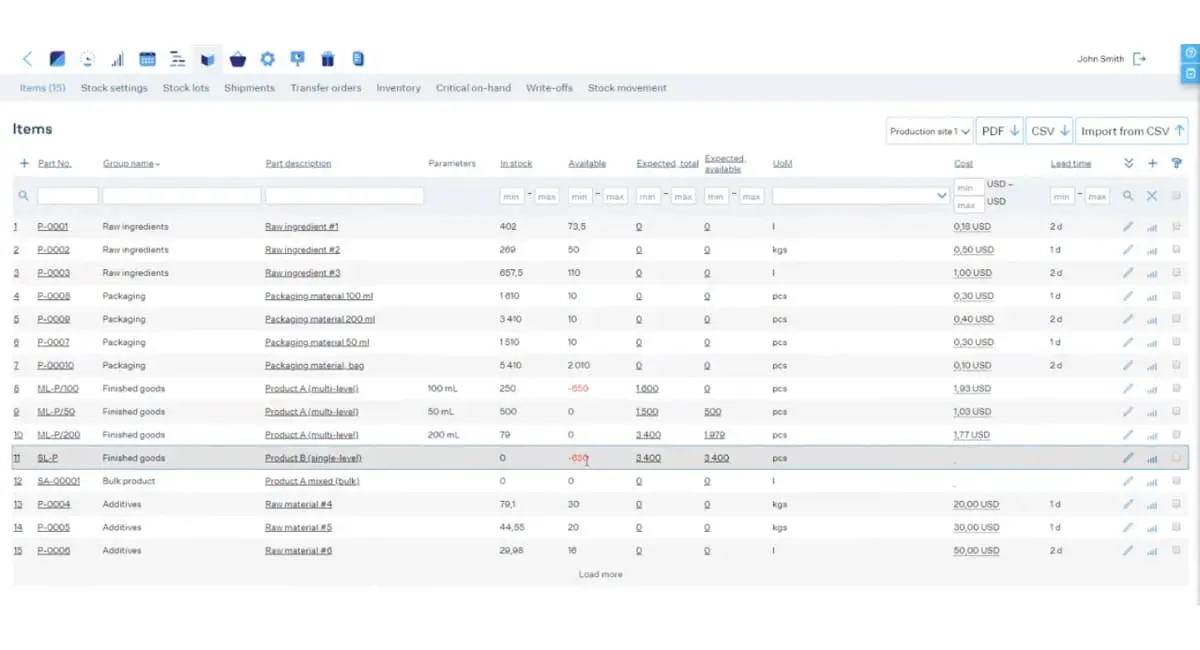
MRPeasy is a self-service production planning software that aims to make manufacturing resource planning efficient, simple, and affordable. It is particularly well-suited for small manufacturers with 10-200 employees.
The software includes modules for production planning, CRM, procurement, supply chain management, and inventory control. It features a drag-and-drop scheduler for resource allocation and integrates with third-party applications like QuickBooks, Xero, Shopify, and Pipedrive through APIs.
Best features:
- Drag-and-drop scheduler: Simplifies the process of allocating resources for different jobs.
- Comprehensive CRM module: Provides access to all customer information, account purchases, and history.
- Lean manufacturing: Combines lean manufacturing principles with serial numbers tracking and production control capabilities.
- Shop floor reporting: Monitors workforce usage and equipment load, which is particularly beneficial for the aerospace and defense industry.
Strengths:
- Affordability: Offers a cost-effective solution for small manufacturers.
- User-friendly interface: The software is praised for its laid-out screens and easy setup.
- Detailed reporting: Provides extensive details from BOMs, customer orders, shipping, and more.
Weaknesses:
- Limited to small businesses: Best suited for small manufacturers, which may not be ideal for larger enterprises.
- No free version: While a free trial is available, there is no permanent free version of the software.
- Integration costs: Additional costs may be incurred for integrating with other software.
13. Inecta ERP
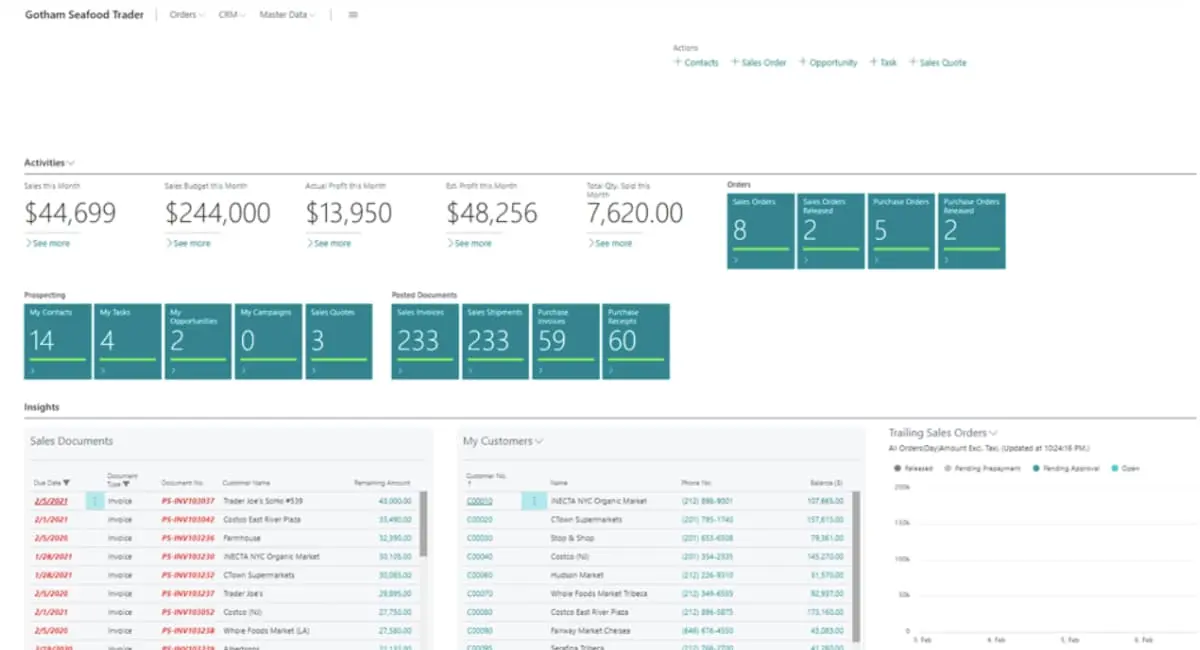
Inecta ERP provides a suite of tools for food manufacturers, distributors, and traders to streamline their processes and increase productivity and efficiency. The software includes features such as recipe configuration, warehouse management, transportation management, and quality control, which are crucial for managing the complexities of food-related businesses.
Best features:
- Ingredient tracking: Allows for detailed tracking of ingredients throughout the supply chain.
- Mock recalls and regulatory inspections: Facilitates compliance with food safety regulations.
- Powerful lot traceability: Ensures precise tracking and traceability of lots for safety and quality control.
Strengths:
- Specialized for the food industry: Tailored features that meet the specific needs of food manufacturers, distributors, and traders.
- Cloud-based solution: Offers the flexibility and accessibility of a cloud-based ERP.
- Powered by Microsoft Dynamics 365: Leverages the robust capabilities of Microsoft’s ERP platform.
Weaknesses:
- No API support: The lack of API support may limit integration with other systems.
- No free trial: Potential users cannot try the system before making a purchase decision.
14. Oracle Fusion Cloud
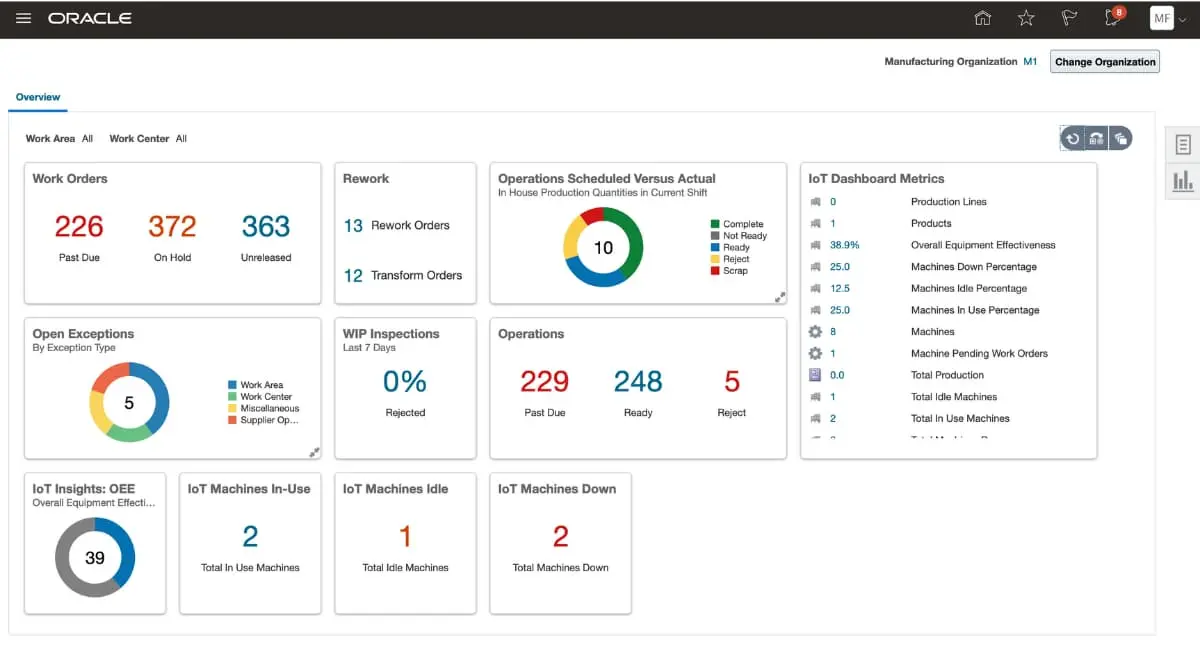
Oracle Fusion Cloud ERP is a core suite of Oracle Cloud SaaS applications that includes modules for financials, procurement, project portfolio management (PPM), risk management, and other enterprise functions.
It is designed to support businesses of all sizes by providing a complete and integrated ERP system that can efficiently and easily manage financials, supply chains, and other processes.
Best features:
- Financial management: Robust financial capabilities, including accounting, revenue management, and financial reporting.
- Supply chain management: Tools to manage the supply chain effectively, including procurement and order management.
- Project management: Integrated PPM for better project planning and execution.
Risk management: Advanced risk management tools to ensure compliance and security.
Strengths:
- Scalability: Can effectively scale with the growth of a business, supporting small to large enterprises.
- Integration capabilities: Offers seamless integration with other Oracle products and third-party applications.
- Regular updates: Quarterly updates reflect direct feedback and enhancements critical to its user community.
- User experience: Incorporates the Redwood design system for an enhanced user interface.
Weaknesses:
- Complexity: Some users find the system complex and challenging to configure.
- Customer support: There have been concerns about the level of customer support provided.
- Learning curve: The comprehensive nature of the software may present a steep learning curve for new users.
15. Sage 100 ERP
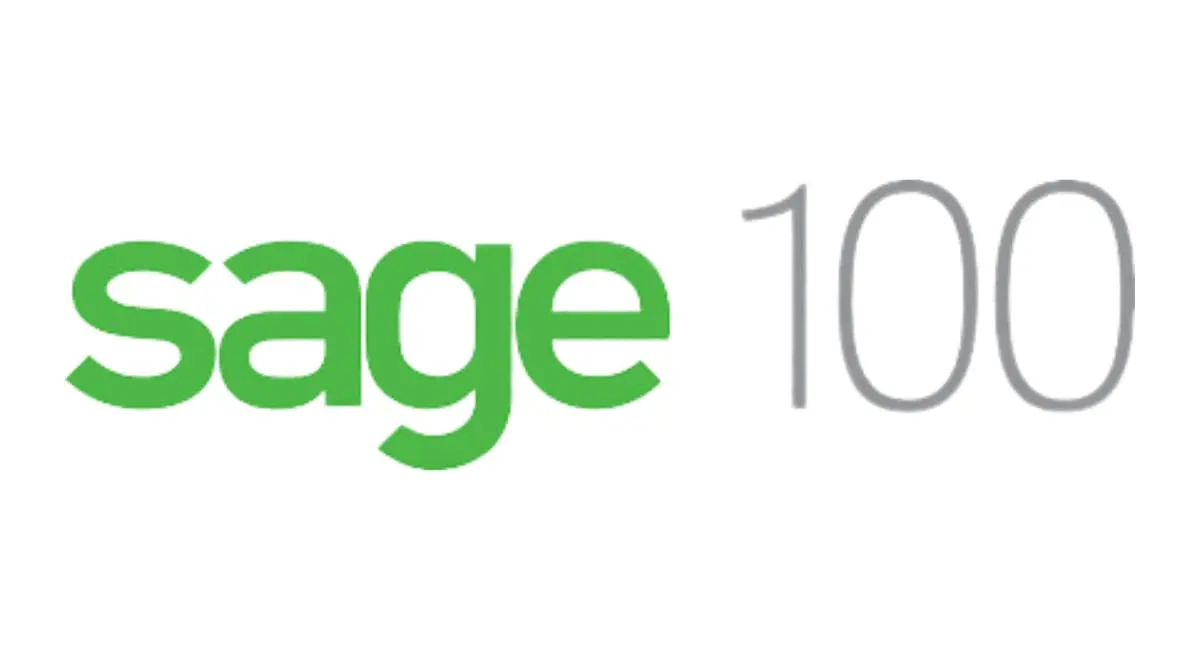
Sage 100 ERP is an off-the-shelf ERP solution that helps companies streamline their financial and operational workflows to optimize their overall business. It features end-to-end capabilities that include modules for core accounting, manufacturing, distribution, business intelligence, HR, project management, and CRM.
The system is designed to monitor materials, jobs, and opportunities easily, making complex processes, whether make-to-stock or build-to-order, simple to handle.
Best features:
- Manufacturing accounting and finance: Provides comprehensive tools for financial management within the manufacturing process.
- Sales and customer management: Helps manage customer relationships and sales processes effectively.
- Purchasing and supplier management: Streamlines the procurement process and supplier relationships.
- Inventory management and warehousing: Enhances inventory control and warehouse operations.
- Business intelligence and reporting: Offers insights and analytics for informed decision-making.
Strengths:
- Flexibility: Customizable financial reports and interface tailored to industry needs.
- Remote access: Supports remote access and multiple devices, facilitating on-location sales teams and executives on business trips.
- Secure and stable: Provides data backup and a secure historical data and forecasting platform.
Weaknesses:
- Complex configuration: Some users find the system complex and challenging to configure.
- Customer support: There have been concerns about the level of customer support provided.
- Learning curve: The comprehensive nature of the software may present a steep learning curve for new users.
How to Choose The Right Food Manufacturing ERP System
After learning all fifteen best food manufacturing ERP systems in the Philippines, now it’s time to choose one that fits your business needs the most. But we know that it might be confusing for you about where to start, thus we provide this section as your guidance.
Choosing the right food manufacturing software for companies in the Philippines involves several critical considerations to ensure that the software aligns with the company’s specific needs and industry standards. Here are some key factors to consider:
- Understand your requirements: Understand your business needs, problems, and goals first. Pinpoint what needs to get better, like inventory, scheduling, or compliance, to pick the right ERP features.
- Software’s credibility and reputation: Check the ERP providers’ reputations. Read reviews and customer stories on sites like Capterra to understand their reliability and how well they work.
- Customization and scalability: The ERP software must be tailored to your food business and grow with it. Ensure the provider can customize and scale the software for your expanding business.
- Integration capabilities: Make sure the ERP system fits well with your current systems and apps. Good integration keeps data consistent and operations smooth across departments.
- Vendor support and training: Check the ERP vendor’s support and training. Good training helps your team use the ERP well, and continuous support is key for solving problems.
- Compliance and regulatory features: For food manufacturing, meeting safety standards is a must. The ERP software should have strong quality, tracking, and compliance tools.
- Cost considerations: Think about all the costs, like licenses, setup, customizing, and help. It’s key to get the right balance of features and costs for a good investment return.
By taking these factors into account, Philippine companies can choose an ERP system that not only meets their current needs but also supports their growth and adapts to future challenges in the food manufacturing industry.
Conclusion
Choosing the right ERP software is very important for food companies in the Philippines. You need to think about what your business needs, how well the software can work with your current systems, and how good the customer support is.
Consider HashMicro’s Food Manufacturing ERP. It’s known for its complete resource planning, built-in CRM, and strong financial tools, all designed to make your work easier and help you make better decisions. HashMicro also promises to adapt and grow with your company.
Try out a free demo of HashMicro’s ERP today. See how it can help your business do well by making tough tasks simple and making your work more efficient. Take this chance to improve your business—test HashMicro’s ERP demo now for a future of smooth and excellent operations.
FAQ about Food Manufacturing ERP
-
What are the key features of food manufacturing ERP systems?
Food manufacturing ERP systems are equipped with various features to enhance efficiency and compliance in the food industry. Key features include:
Inventory Management: Real-time tracking, automatic reordering, and batch/lot tracking to manage stock levels and reduce waste.
Recipe and Formula Management: Tools to create, manage, and track recipes and ingredients, ensuring consistent product quality.
Quality Control and Compliance: Integrated quality inspections and compliance documentation to meet food safety regulations.
Supply Chain Management: Comprehensive features for procurement, supplier management, and logistics to optimize the supply chain. -
How does ERP software help maintain food safety and compliance?
ERP software helps maintain food safety and compliance by providing modules that manage quality control and traceability. It allows businesses to perform quality inspections, manage product recalls, and ensure adherence to food safety standards such as HACCP and GMP. This real-time monitoring and documentation help businesses stay compliant with regulatory requirements and minimize the risk of non-compliance.
-
What role does ERP play in improving production planning and scheduling?
ERP systems significantly improve production planning and scheduling by providing tools to help forecast demand, schedule production runs, and manage resources efficiently. Features like Master Production Scheduling (MPS) and Material Requirements Planning (MRP) ensure that materials, labor, and equipment are optimally utilized to meet production goals. This leads to improved production efficiency and reduced downtime.
-
How does ERP software support financial management in food manufacturing?
ERP software supports financial management by integrating financial operations with other business processes. It offers modules for cost analysis, profitability management, and financial reporting. This integration helps businesses maintain accurate financial records, manage budgets, and effectively perform cost control measures. ERP systems also ensure compliance with financial regulations by automating tax calculations and facilitating seamless financial audits.
-
Can ERP systems handle supply chain disruptions in the food industry?
Yes, ERP systems are designed to handle supply chain disruptions effectively. They provide visibility across the supply chain, enabling businesses to track inventory levels, manage supplier performance, and forecast demand. This proactive approach helps mitigate the impact of disruptions by ensuring timely procurement, optimizing inventory levels, and maintaining efficient operations.





